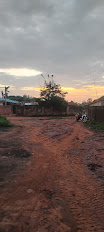
Last Thursday was the anniversary. One year of sweat, minor illnesses, major personal discoveries, hard work, humility, cultural exchange, and more than I could possibly put into words. I could write a love letter to Benin. I could also easily extol every hardship I’ve faced during my time here. It has not been an easy journey, to say the least.
I knew that my horizons would be expanded, but I didn’t really understand what that meant. I didn’t know the ways my identity would stretch, expand, and compact to fit into new perceptions or the skills I would need to use and refute these ideas to do the work of a Peace Corps volunteer.
Here, I’m white. I’m a yovo first, in most cases. It’s exasperating to have heard this word for an entire year, having all of my effort and experiences seemingly stripped and folded into one four letter word. I would be lying, though, to suggest that this has created a dangerous or unwelcoming environment for me. In Benin, race is only an observation. “She’s white.” It’s true. That’s a fact. Anyone can see that. As an American, it feels othering and a little inappropriate, but that simply isn’t the social perception in this instance.
Here, I’m a woman. I’m a white woman which complicates the experience. People sort me into mixed categories hierarchily. I sit with village leaders due to my status as a Peace Corps volunteer, but then there are other times at restaurants when I’m served a warm drink even as my male colleagues receive cold ones. It’s also hard to manage the marriage proposals and harrassment. Those who are invested in working with me and being my friend know to protect me from that, but not everyone recognizes my particular sensitivity. Here, marriage is often seen as the highest priority and achievement of a woman, and I am anomalous in my un-marriedness.
Here, I’m an English speaker. It’s my mother tongue (a phrase that does NOT translate… The few times I tried to frenchify it, people laughed and asked me what my father’s language was). It’s an asset as a teacher to have an instinctive feel for how to guide student pronunciation and sentence formation. It’s revealed a lot to me about how much I don’t really understand about the structure of my language and how to bring others without that instinctive feel along. How to teach language! I operate in a tri-lingual world, working in English, living in French, and connecting in Adja. My knowledge in all three languages progresses slowly as a consequence of the wide berth of communication I’m dealing with. I hate that. I wish I was perfect at all three of my languages. Or even two of them. Or even one of them. Anyways. I’m learning to live with it.
Here, I eat with my hands. I eat pate and pilée. I eat yams and rabit and wagashi and chicken and fish and sometimes even a vegetable if I can bring myself to search for it in the market. I eat a lot of pasta at home. A lot. Too much. I recently bought jam, and now PB&J is making it into my menu rotation. So is ramen with soft-boiled eggs.
Here, I read. I read African literature that I now appreciate with a greater understanding of West African context in particular. I read the same fantasy and romantasy that animated my nights in the US. I read nonfiction and expand my understanding of the world around me. I read childhood favorites translated into French and I collect new words like gems, storing them in my collection until I can examine and polish them, to be added to my growing collection.
Here, I travel. I go on daytrips to eat lunch with friends and sit in rooms with overhead fans. I travel north and south for weekend festivals and good company. I’ve seen the ocean, I’ve seen the hills. The worst quality roads I’ve experienced in my life and cool early morning motorcycle rides, the sun warming (and burning) my shoulders.
Here, I connect. I connect with host country nationals (the Beninese) in work and in play. Getting to know my counterpart has been one of the most special things about my time here. My host-father and his earnestness to show me his community has been a guiding light for how to approach my service. Some of the most important work I do is in those evening walks.
I connect with my American peers, who come from all across the US and beyond. I’ve gained understanding of multicultural perspectives and had the novel experience of representing “the south” to people from other parts of the country. It’s a weird feeling, as I’ve always been immersed in Oklahoma-ness and been affirmed by other Oklahomans. It’s a challenge to relay in equal measure my love for the state alongside my concerns, of which I have many. I don’t want my friends to mistake my criticism for dismissal, though. Oklahoma’s skies are too stunning and bright for me to do that. It’s a unique experience to connect with other Americans when no one is on their “home turf.” We’re all, for the time being, expats in Benin just doing our best in an unfamiliar environment.


Here, I’m not alone! I have friends and connections in ways that would have stunned me a year ago. I’m also so eager to welcome the new cohort into Benin. It was through their eyes that I saw all that I have and looked back towards my service, eager to keep building.
With love,
Lena












